Compelling music vies with chaotic librettos in Lyric Opera’s “Proximity”
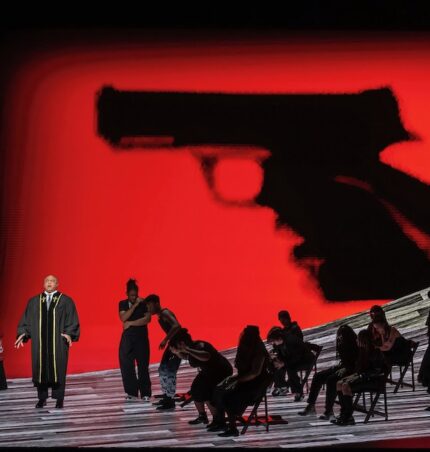
Lyric Opera is closing its main non-Broadway season with a triptych of world premieres: three new operas of contemporary relevance debuted in a single evening under the title “Proximity.” This initiative was curated by Renée Fleming, the company’s on-again, off-again creative consultant, this time in collaboration with stage director Yuval Sharon.
Even with two excellent, Pulitzer Prize-winning composers—Caroline Shaw and John Luther Adams—and the up-and coming Daniel Bernard Roumain, one was wary about this project for a few reasons. Partly because of Fleming’s mixed record of success in curating new works—her previous major project was the expensive non-hit Bel Canto; partly because two of the three composers had never written an opera before; and partly because of the involvement of Sharon.
Heavily promoted as the hotshot stage director of the moment, the Israeli director’s most recent brainstorm was presenting La Boheme in Boston with the four acts performed in reverse order and with an interpolated narrator.
In fact, the production of “Proximity” (designed by Jason H. Thompson and Kaitlyn Pietras) and Sharon’s direction at Friday night’s premiere were, surprisingly, among the most consistent elements of the evening. Rather than presenting the three operas sequentially, the director interstitched scenes from each (in the correct chronological order), which unified the evening even if the arrangement tended to dramatically shortchange the two more concise works. The massive projections of Google Earth satellite photos of Chicago and shifting, light-saber style visuals were often dazzling, albeit sometimes at the expense of pushing the music and singers into the background.
Opening night was not without its drama. The excellent mezzo-soprano Zoie Reams, who had large roles in two of the evening’s operas, bowed out due to a “severe throat infection,” according to Anthony Freud’s curtain announcement. Cast members were reshuffled and the show went on. (Also, though not mentioned in the program, voices in all three operas were amplified throughout.)
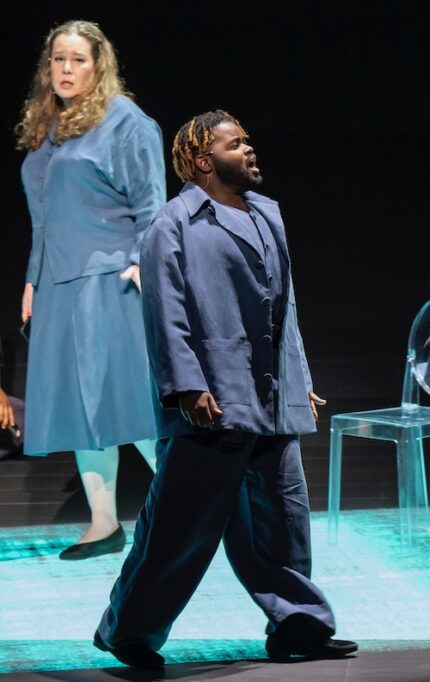
Caroline Shaw’s Four Portraits examines loneliness and urban alienation in the age of social media—in this case, the inability to make romantic connections between A (countertenor John Holiday) and B (transgender baritone Lucia Lucas). Shaw’s own libretto (with Jocelyn Clarke) makes some timely if not exactly original points about social disassociation with people being glued to their phone screens and mindlessly following the directions of their GPS. (There are some eye-popping visuals of subway trains and cathode-ray high rises as B drives the unnamed city’s streets.) Ultimately, a kind of catharsis is reached as the characters leave the city for the forest where they finally meet in person.
The music is cast in Shaw’s familiar style, building epigrammatic fragments of phrases (“Hello?”; “Can you hear me?”; “It’s not working.”) into broader melodic waves. Lucas as B is more of an actor than singer here and gets few vocal opportunities. But the opera culminates in some surprisingly lush music for A and the chorus, and Holiday delivered his solos with fervent expression and a rich and lustrous countertenor.
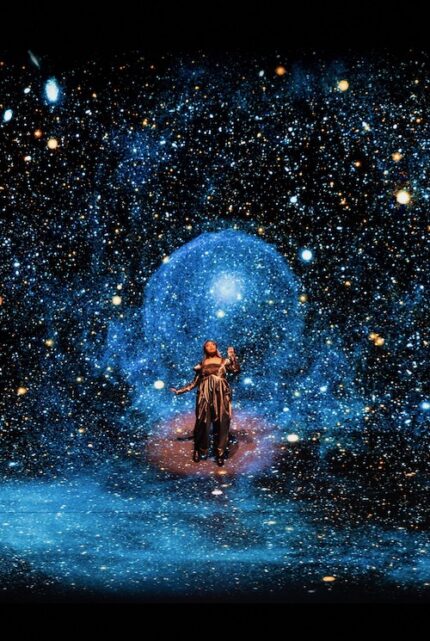
John Luther Adams’ Night is the shortest work of the evening and consists of just a single scene. Essentially a monodrama for mezzo-soprano with chorus, the soloist is the Sibyl, an oracle who descends from the nocturnal planetary sky—in a striking but rather campy visual—to warn, Erda-like, of future environmental dangers.
Luther Adams is a composer of great integrity, who states in a program note that even with this plea for environmental responsibility, he is dubious about political activism in art. While Night is not among his most original works, the music is characteristically well crafted, especially the choral waves in the middle.
Subbing for Reams, Katherine DeYoung did a creditable job tackling John Haines’s wordy text while making supplicatory gestures as the Sibyl; the Ryan Opera Center member also showed trouper chops, singing while descending on wires from the top of the stage. The men and women of the Lyric Opera chorus, dressed in black and stationed on separate sides of the house, gave supreme advocacy to Adams’ choral passages.
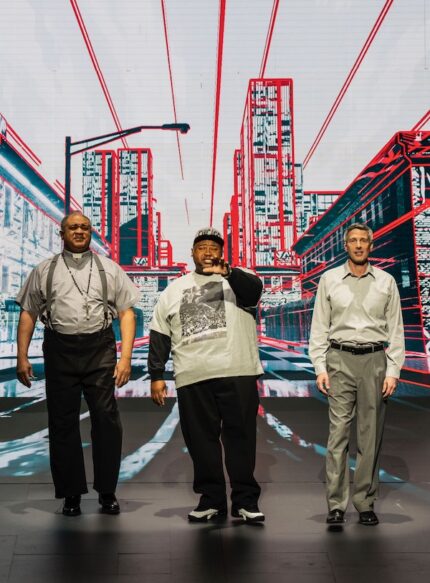
Daniel Bernard Roumain’s The Walkers offered the most expansive, musically rewarding and yet most problematic work of the evening. Coming after his We Shall Not Be Moved, the Skokie-born composer’s second opera examines Chicago violence, the gang culture ethos and related issues, social and political.
Of the three operas, The Walkers feels the most like a work in progress. One hopes that it will be given time to be shaped into something tighter and more cogent before being hurried on to multiple stages.
The main issue with The Walkers is Anna Deavere Smith’s ramshackle libretto. In addition to the bizarre repetitions in the opening scene (“You know, you know, you know” and “uh, uh, uh”), she tries to cram too much material into a 75-minute piece. The result is a multitude of ill-defined characters and a scattershot scenario lacking a clear and convincing dramatic arc.
At times, Smith’s libretto conveys a certain kind of rough street-smart poetry, often when using the compelling words of real people, whose names and images appear on the projections. Most of these characters are composites of people she has interviewed.
Among those was Arne Duncan, former secretary of education in the Obama administration and CEO of Chicago public schools. He must have impressed her since Smith has inserted Duncan into the opera as a major character—one of the title “walkers” who roam the streets of Chicago’s poorest neighborhoods to talk to gang members in an attempt to understand and neutralize gang violence.
Even the most partisan Chicago Machine apologist will roll their eyes at Smith’s treatment of Duncan as a plaster saint. One could almost rename the opera Arne Duncan Explains it All For You. Copiously quoted throughout, at one point Duncan unfurls a hoary laundry list of the main culprits for Chicago’s violence: the police (of course), guns, racism, etc. Anyone who might upset the standard narrative by pointing to a highly ideological state’s attorney, judges with revolving doors for violent offenders, and the perpetrators themselves can go wait in the car.
Late in the opera, one gang member asks Duncan why he is in the hood talking with them. “I’m here because you’re here,” replies the white savior. At that cringe moment one half-expected Barack Obama to descend from the heavens on stage and bestow a blessing on St. Arne.
Such vacuous moments are unfortunate because Roumain’s score is striking and highly impressive. Granted, the uneasy mix of rap, hip hop and operatic style doesn’t always cohere, and too much of the copious dialogue is backed by an unvaried drum-led jazz riffing.
Yet Roumain’s music often rises to remarkable heights in the solo arias and, especially, the large ensemble of the funeral scene for Lil’ Bunchy Bates. Roumain clearly has a real feel and dramatic gift for operatic form—more so, in fact, than his better-known “Proximity” fellow composers.
Despite the libretto’s weaknesses, a stellar cast gave Roumain’s music the finest possible advocacy.
With his powerful voice, the veteran Gordon Hawkins commanded the stage as Preacher Man. Norman Garrett displayed an imposing baritone as Bilial, while Issacha Savage was a characterful if somewhat wobbly Curtis Toler. Kirsten Piper Brown delivered an intense performance as Chief’s Daughter #1. Jeff Parker did what he could with the paper-mache spoken role of Duncan.
Also making firm impressions were Whitney Morrison as Yasmine Miller and the young Jamion Cotten as Lil’ Bunchy Bates. In a duo subbing for the indisposed Reams, Stephanie Sanchez sang the role of Chief’s Daughter #2, while Meroë Khalia Adeeb performed it onstage.
Conductor Kazem Abdullah made a strong company debut. He kept the evening on track, coordinating the Lyric Opera Orchestra with the singers and the busy light show, and maintained a firm musical flow through multiple scenes and a trio of composers with highly disparate styles.
“Proximity” runs through April 8. lyricopera.org

Posted in Performances
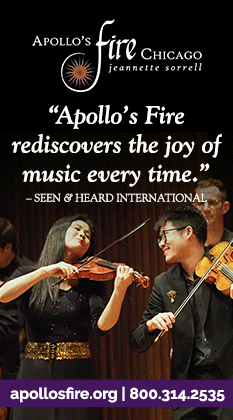
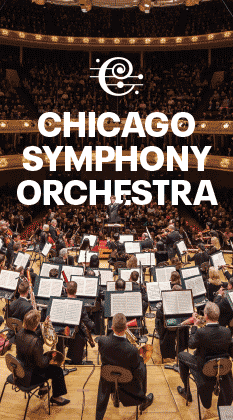
Posted Mar 26, 2023 at 7:26 am by John
Anthony Freud, Renee Fleming, and miked voices at the Lyric? No thanks.
Posted Mar 27, 2023 at 10:27 am by P.Ryan
Miked voices ??!! More than I can stand. Good bye Lyric.
Posted Mar 29, 2023 at 10:16 pm by Ann G
Why bother commenting if you have not seen or have no interest in seeing the performance ? This was a refreshingly ambitious undertaking that wasn’t always successful but had stunning and moving moments. Kudos to the Lyric for developing new work.
Posted Mar 30, 2023 at 10:25 am by Delilah S.
Thank you for calling out the Arne Duncan aspect of “The Walkers”. It was the one disingenuous aspect of an otherwise compelling new work. This piece will have a much more universal appeal and artistic integrity without it.
Posted Apr 09, 2023 at 9:01 pm by Jef Bies
Great review. The challenge of interlacing 3 complex topics into one performance did not provide a deeper connection to any, although ‘The Walkers’ did begin to develop the characters and story behind urban violence.